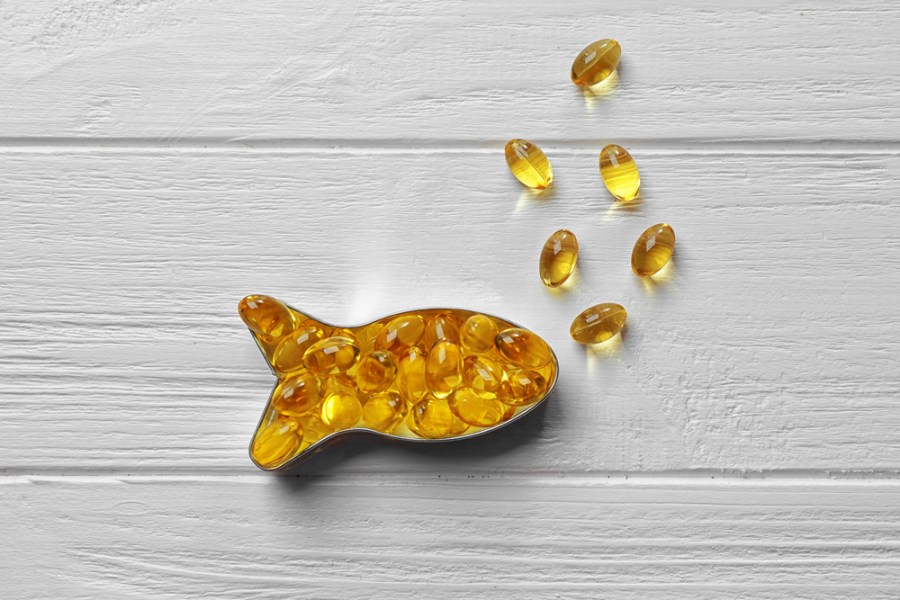With latest reports showing little to no benefit for our hearts, we ask – are omega-3 supplements really worth taking?
What is omega-3 and what are its health benefits?
Omega-3s are a group of long chain fatty acids and key members of the polyunsaturated fat family. There are three main types… alpha-linolenic acid (ALA), which is found in plant oils, eicosapentaenoic acid (EPA) and docosahexaenoic acid (DHA), which are commonly found in fish and fish oils. For years it was believed these fats could help keep our hearts healthy.
Most people are low in omega-3
New research has now revealed that many British people only eat oily fish once every six weeks, because of a combination of price and taste. It’s possible that this lack might cause low levels of omega-3.
What happens if you have an omega-3 deficiency?
Symptoms of being low on omega-3 includes:
- Aching joints
- dry skin
- raised cholesterol levels
Which foods contain omega-3?

- Mackerel
- Salmon
- Cod liver oil
- Herring
- Oysters
- Sardines
- Anchovies
- Caviar
What vegetarian sources of omega-3 are there?
- Flaxseeds
- Chia seeds
- Walnuts
- Soybeans
- Spinach
- Brussel’s sprouts
- Grass-fed dairy
- Omega-3 enriched eggs
Does omega-3 help heart health?
Eating foods rich in polyunsaturated fatty acids such as omega-3 improves blood cholesterol, which can cut your risk of heart disease – that’s been the accepted wisdom for many years, but new findings from independent researchers have led experts to question this theory. The review, carried out by lead author Dr Lee Hooper from the University of East Anglia, collated all available and accepted data on the effects of omega-3s to see what, if any, impact they have on heart health. The findings came from 79 trials on more than 110,000 people and the results have got us all talking.

‘They don’t protect your heart’ – Says Dr Lee Hooper from the University of East Anglia
‘Back in the 1970s, researchers studied a tribe of Inuits and discovered that, as a group, they had very few heart attacks and cardiovascular issues. At the time they put this down to their diets, which were high in omega-rich oily fish. People were very excited about this discovery and some early trials even showed some promising signs of this being true.
‘As a result, we have, for many years now, been taking omega-3 supplements under the impression that they help keep our hearts healthy. But of course, Inuits had
a very active, outdoor lifestyle so there could have been many other reasons behind why they had very few heart attacks.
Omega-3 research results
‘We looked at studies of at least a year upwards, as it can take up to six months for your body fats to adjust to taking omega supplements. We also looked at all three of the main omega-3s, including those found in fish oil supplements, plant-based supplements and oily fish itself. We found both types of supplements had no impact on heart health whatsoever and weren’t preventing deaths linked to heart disease. ‘What they did do is help lower levels of triglyceride fats in the blood, but this type of fat has little impact on heart health. ‘Triglycerides act more as an indicator of how healthy your blood is and whether you are carrying too much fat, but they’re not directly linked to your heart as they don’t invade and stick to your artery wall. Other than this there was very little impact.
Are omega-3 supplements harmful? Could will they make me put on weight?
‘An important point to note is that, while omegas don’t help your heart, there is certainly no evidence to show they harm it either. Nor do they make us gain weight as has often been thought. The study is part of a series into polyunsaturated fats and their impact, and while they might not be beneficial for heart health, that doesn’t mean they don’t help in other areas. ‘We would never discourage anyone from enjoying delicious oily fish. However, people may want to consider whether they really need to spend money on supplements if they’re buying them purely for heart health.’
‘They are vital in many areas of your health’ Says Dr Sarah Brewer, Healthspan Medical Director (healthspan.co.uk)
Fish-oil supplements are not magic bullets. They’re not intended to have the miraculous power of preventing death by heart disease, but instead are there to supplement your diet. The NHS recommends you eat two portions of fish per week one of which should be oily. ‘But National Diet and Nutrition Surveys (NDNS) show that intakes of fish are low, which is where supplements come in handy.
Omega-3s play a particularly important role in many areas of your body aside from your heart – they are the building blocks of cell membranes and hormones and help to regulate inflammation throughout your body. They also have some more specific jobs, too…
Omega-3 can help brain health
‘Omega-3s maintain nerve cell membrane flexibility to speed the transmission of chemical and electrical messages. DHA is structurally important in the brain while EPA is involved in cell signalling. Further, a study from Oxford scientists suggests that combining omega-3 fish oils with B vitamins might slow the progression of brain shrinkage in people with Alzheimer’s disease by up to 70 per cent in some cases. The study took 168 people over the age of 70 with mild cognitive impairment and divided them into two groups – one of which took high-dose B vitamins, while the other took an inactive placebo for two years. In those taking the B vitamins, the rate of brain atrophy slowed by 40 per cent compared with those on the placebo, but only if they also had levels of omega-3 fatty acids in their blood already from their diets. In those who had a raised level of the amino acid, homocysteine, which is linked with dementia, the protection was even greater, with the rate of brain shrinkage reduced by 70 per cent.
Feel happier with omega-3
‘As well as keeping our brains healthy, omega-3 is also said to keep us happy. The results from 21 studies, involving more than 255,000 people, found that those who ate the most fish and obtained the most DHA and EPA were 22 per cent less likely to develop depression than those who ate the least.
Younger looking skin with omega-3
‘Omega-3 can also work wonders for your skin. The fatty acids help to keep it hydrated, while the inflammation-fighting powers help to calm any inflammatory conditions such as acne or psoriasis and help to keep your skin smooth, hydrated and wrinkle free. For healthy joints ‘Finally, fish oils also have a pain-killing effect like that of non-steroidal anti-inflammatory drugs. This coupled with their ability to reduce inflammation means they can ease joint pain and swelling.’
- Now read: How much fat does the body need each day?
- Try the raw food diet for great health benefits








